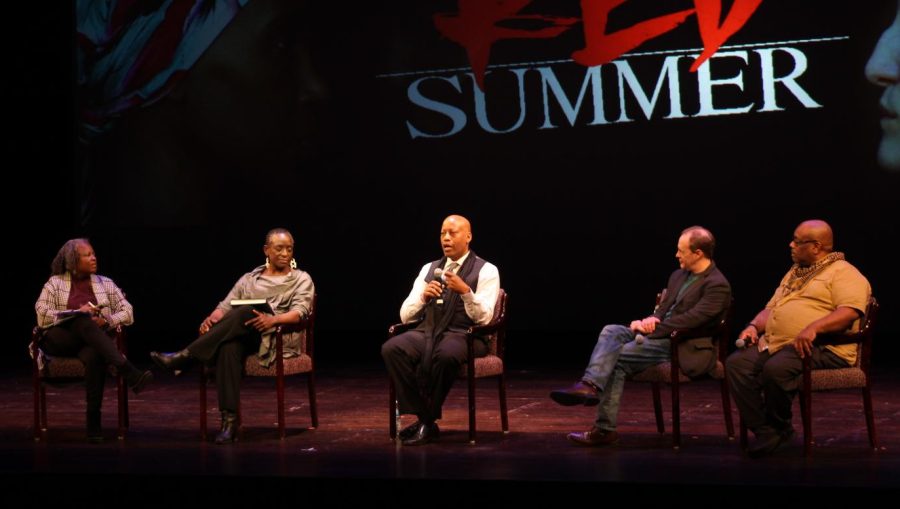“Red Summer” preview focuses on still-simmering, century-old issues
Sylvia Ewing moderator (left to right), Dr. Phyllis Wes (Director of GSU’s Social Justice Initiative), Shepsu Aakhu (playwright), Andrew White (playwright), and Shawn Wallace (composer).
In anticipation of the September 2022 premiere of “Red Summer,” a modern musical based on the Chicago race riots of 1919, Governors State University’s Center for Performing Arts held a preview event on March 26. Attendees were the first to see excerpts of the play, meet and engage with the playwrights and learn more about the history and background of the historical events the play is based on.
The event began with an introduction from the writers of the play, Shepsu Aakhu and Andy White. Aakhu, a prolific African-American playwright and co-founder of MPAACT (Ma’at Production Association of African Centered Theatre), began writing and collaborating on Red Summer with Andy White, co-founder of the Lookingglass Theatre Company, in response to America’s continued racial divisions.
“2019 was the centennial of the ‘Red Summer,’ which earned its name due to the blood that ran freely in the streets of Chicago (and many other American cities),” Aakhu said. “Yet, these events are largely forgotten and unknown to the general populace, even to those who live in the cities in which they took fierce hold.”
The story of the play focuses on two WW1 soldiers, one black and one white, who had fought together on battlefields only to find themselves caught in the violence of the city. The two men become pitted against one another as their own friends and family grow hostile and violence erupts on both sides. This all takes place during the Great Migration, the downturn of the economy during 1919, and the return of WW1 veterans.
The writers sat down to have a conversation with the audience as well the artistic team, such as Shawn Wallace, composer of the play. Discussion of the creative process unraveled the purposeful choices that pushed the message of the play. Wallace explained: “We’re trying to craft the best stories we can… our choreography echoes the story.”
As described, “Red Summer” is based on the race riots in Chicago that began in the summer of 1919. It was the death of a young black teenager, Eugene Williams, that sparked the riots. Williams and his three friends had taken their makeshift raft into Lake Michigan during a hot day in July. The young men drifted close to a white-designated beach, where George Stauber, a white man from that beach, began to throw stones, hitting Eugene, causing him to fall into the lake and drown. Beachgoers from both sides realized what had happened, and police involvement aggravated the situation, leading block-to-block warfare lasting eight days, The toll: 38 dead (23 black, 15 white), more than 500 injured, and over 1,000 black families left homeless after their homes were burned.
“Today, more than 100 years later, the same issues still simmer in every metropolitan area in America,” White stated.
A musical number from the show was performed, reflecting the chain of events leading up to the riots. Shortly afterward, the artistic team came out again to answer questions from the audience.
“This story must be told because it sheds a light on a chapter of our shared history that is too often overlooked, in the hope that an honest look at our past will make it possible to have a clearer vision of our future,”Aakhu said in his closing remarks.
“Red Summer” will premiere at GSU’s Center for Performing Arts on Sept.16-18 and Sept. 23-25, 2022. For more information on the play’s dates and times visit https://www.govst.edu/RedSummer/
Join the “Red Summer” Dance workshop series. There will be a three-part dance series conducted by Choreographer Rueben Echolas at GSU. Choreography from “Red Summer” will be taught during the first two workshops. The third workshop will be auditions to cast dancers in the production.
Workshops will be held at the Center for Performing Arts, Green Room on April 20 and 25 from 7:30-9:45 p.m.
For more information on the workshop contact Professor Megan Lindsay.

